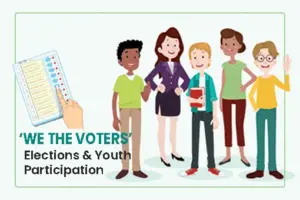
Why in News?
- As India gears up for the 18th Lok Sabha elections, a critical concern emerges: the reluctance of the country’s youngest eligible voters to engage in the electoral process.
- Despite being a significant demographic, many young Indians seem hesitant to participate actively in voting, raising questions about the future of democratic engagement in the nation.
Historical Trends Reflecting Youth Disengagement:
- The statistics paint a concerning picture: less than 40% of voters aged between 18 and 19 have registered for the 2024 elections.
- This trend is particularly pronounced in states like Delhi, Bihar, and Uttar Pradesh, where enrollment rates remain strikingly low despite their youthful populations.
- Despite the widespread exposure to political voices through social media, many young people still feel disconnected from the political process.
Root Causes of Youth Disengagement:
- Several factors contribute to this disengagement. Firstly, the lack of political education within the formal schooling system leaves many young people ill-prepared to understand the significance of civic engagement and voting.
- The curriculum often lacks critical thinking skills and fails to instill political awareness.
- Additionally, political parties often overlook key issues that are of significant concern to the younger demographic, such as job opportunities and affordable higher education. Moreover, the underrepresentation of youth in political decision-making bodies further exacerbates feelings of disenchantment.
Challenges Posed by Voter Disinterest:
- The reluctance of young voters to participate in the electoral process poses significant risks to democracy.
- Disenfranchisement, whether due to legal barriers or social pressures, undermines the fundamental principle of active citizen participation in governance.
- Moreover, low voter turnout raises doubts about the legitimacy of electoral outcomes and perpetuates exclusion for marginalized communities.
Empowering India’s Youth: A Way Forward:
- To address these challenges, concerted efforts must be made to engage and empower India’s youth in the democratic process.
- Firstly, there is a need for youth-centric political agendas that address issues like job opportunities, affordable education, environmental sustainability, and mental health awareness.
- Increased representation of young people in decision-making processes is also essential to ensure their voices are heard and their concerns addressed.
- Moreover, providing platforms for young voices to be heard and valued in societal and political discussions is crucial.
- Recognizing the power of every vote is essential to breaking free from the cycle of disenfranchisement and ensuring inclusive governance.
- Focus should be placed on states with large youth populations, addressing their concerns during political campaigns, and dispelling stereotypes about their social awareness and engagement.
- Furthermore, efforts should be made to orient young people towards the impact of their decisions, sensitize them towards local and national issues, and emphasize the consequences of not participating in the democratic process.
- Harnessing the potential of digitally connected and socially aware youth is key, encouraging activism, social responsibility, and empowerment among young voters.
- Educational initiatives, such as workshops and seminars, can play a crucial role in enhancing political literacy and fostering a sense of civic duty among the youth.
- Exploring the possibility of implementing secure online voting could also accommodate the preferences of the digital generation, further enhancing accessibility and participation in the electoral process.
Conclusion
- empowering India’s youth to actively participate in democracy is not just a matter of civic duty but a necessity for the sustainable future of the nation.
- By addressing the root causes of voter disinterest and fostering a culture of engagement and empowerment, India can ensure that its democratic ideals thrive for generations to come.
People also ask
Q1: How do I know if I’m eligible to vote in India?
Ans: Eligibility to vote in India is determined based on citizenship and age. Citizens of India who are at least 18 years old on the qualifying date (1st January, 1st April, 1st July, or 1st October of the year of the electoral roll revision) are eligible to register as voters.
Q2: What documents do I need to register as a voter?
Ans: To register as a voter, you need to provide proof of identity and proof of residence. The most commonly used document for identity proof is the Electors Photo Identity Card (EPIC), commonly known as the voter ID card. Other acceptable documents include Aadhaar card, passport, driving license, PAN card, etc.